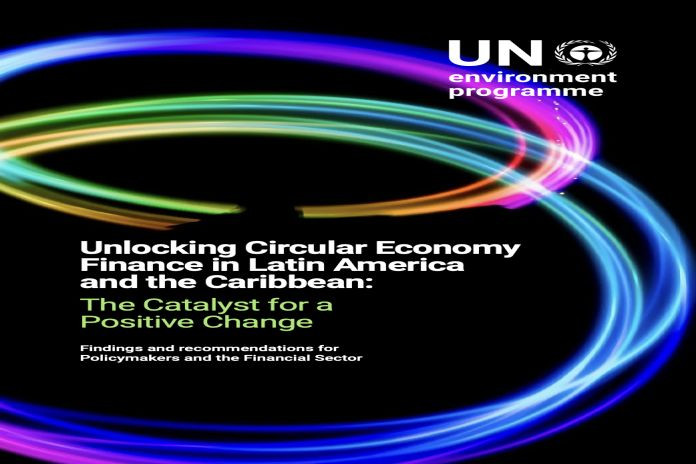LATIN AMERICA / CARIBBEAN – A new report recommends that Latin America and the Caribbean accelerate the transition to a circular economy by overhauling laws and partnering more closely with the private sector to fund projects with a circular model. The study, entitled Unlocking Circular Economy Finance in Latin America and the Caribbean: The Catalyst for a Positive Change, was led by the United Nations Environment Programme (UNEP) and its financial initiative (UNEP FI), with support from the Inter-American Development Bank (IDB) and IDB Invest.
The report analyzes public policy and finance instruments for circularity in seven countries and sets out ways to move towards a circular economy and make more financing available to companies and projects in the region. The analysis shows that the countries are on the right path towards circularity and that a combined action with different actors will be key to meeting the climate goals.
The need for sustainable production and consumption models that reuse products and preserve the world’s non-renewable natural resources is more pressing now than ever. By applying a circular lens, financial institutions can assess production and consumption models and find new ways to minimize waste and pollution. But the gap between current investments and those needed to support the crucial transition to circular production and consumption models is still enormous. The financial sector and government agencies play a key role in spurring on the circular transition through innovative financial instruments and policies.
“Circular financing goes beyond innovation and green finance. It should also adopt a broader vision of value creation, new methods for assessing risk, long-term thinking, and initiatives for collaboration,” said Susana Cordeiro Guerra, manager of the IDB’s institutions for development sector. “This report identifies opportunities for both governments and financial institutions to ensure that investments help create more sustainable and equitable economies in the region,” she added.
The study urges countries to update and adapt their environmental laws, adding legislation on circular economies. It also recommends creating classification systems, definitions and metrics to help countries and investors understand which activities follow circular economy principles.
Countries should also forge close partnerships with the private sector to cultivate a financial ecosystem that favors the circular economy. Under this arrangement, public-sector and private-sector financial institutions would cooperate to fund circular businesses and projects at different stages of maturity. This public-private nexus can help local circular markets develop and optimize resource allocation.
“The pandemic exposed the pivotal role of the micro, small, and medium-sized enterprises (MSMEs) and supply chains of Latin America and the Caribbean in the face of volatility and material shortages. The circular economy makes value chains more resilient and inclusive because it fosters innovation, reduces waste and pollution and boosts effectiveness,” explained Alexandre Meira da Rosa, chief strategy officer for IDB Invest. “This report lays out best practices for reducing the circularity gap and fueling a transition that avoids leaving vulnerable groups behind.”
Lastly, the report recommends that governments and financial institutions enable MSMEs to become key drivers of the circular economy by helping them build capacities, integrating them into value chains and giving them access to credit to fund their initiatives to modernize or adapt their operations.
“The only way to make it through the planet’s triple crisis -of climate change, biodiversity loss and pollution – is for all economic players to join forces to find innovative solutions to expand investment and throw their weight behind a sustainable and inclusive future for all,” said Eric Usher, head of the UNEP FI. “Financial institutions and government administrations need to work together to provide financing for circular business models that help build a fair, regenerative and circular global economy,” he added.
“The circular economy proposes a resilient, diverse, and inclusive economic model that creates opportunities for sustainable growth different to the ‘take, make and dispose of’ mentality. It fosters long-term economic productivity and green jobs while tackling global challenges like the aforementioned triple crisis. This study is part of a broader work by UNEP with the Circular Economy Coalition for Latin America and the Caribbean, where various actors in the region work to encourage governments and the private sector to move in that direction,” says Beatriz Martins Carneiro, regional coordinator of UNEP finance and economic transformations.
The study was co-funded by Germany’s Federal Ministry for the Environment, Nature Conservation, Nuclear Safety and Consumer Protection (BMUV) and the European Commission. The research and technical review were carried out by the Instituto Escolhas and Exchange 4 Change Brasil.





